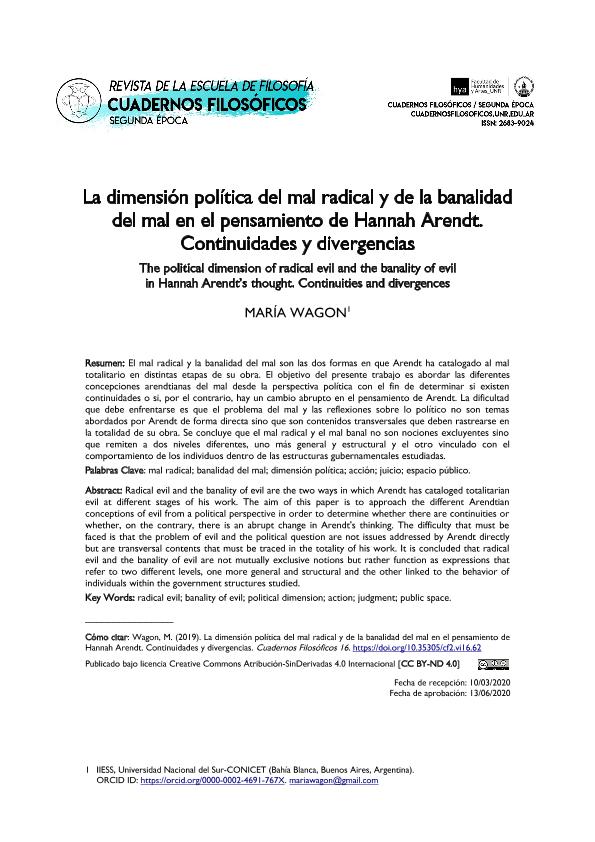Mostrar el registro sencillo del ítem
dc.contributor.author
Wagon, María Elena

dc.date.available
2021-05-04T19:19:30Z
dc.date.issued
2020-11-13
dc.identifier.citation
Wagon, María Elena; La dimensión política del mal radical y de la banalidad del mal en el pensamiento de Hannah Arendt: Continuidades y divergencias; Universidad Nacional de Rosario. Facultad de Humanidades y Artes. Escuela de Historia; Cuadernos Filosóficos. Segunda Época; 16; 13-11-2020; 1-24
dc.identifier.issn
2683-9024
dc.identifier.uri
http://hdl.handle.net/11336/131324
dc.description.abstract
El mal radical y la banalidad del mal son las dos formas en que Arendt ha catalogado al mal totalitario en distintas etapas de su obra. El objetivo del presente trabajo es abordar las diferentes concepciones arendtianas del mal desde la perspectiva política con el fin de determinar si existen continuidades o si, por el contrario, hay un cambio abrupto en el pensamiento de Arendt. La dificultad que debe enfrentarse es que el problema del mal y las reflexiones sobre lo político no son temas abordados por Arendt de forma directa sino que son contenidos transversales que deben rastrearse en la totalidad de su obra. Se concluye que el mal radical y el mal banal no son nociones excluyentes sino que remiten a dos niveles diferentes, uno más general y estructural y el otro vinculado con el comportamiento de los individuos dentro de las estructuras gubernamentales estudiadas.
dc.description.abstract
Radical evil and the banality of evil are the two ways in which Arendt has cataloged totalitarian evil at different stages of his work. The aim of this paper is to approach the different Arendtian conceptions of evil from a political perspective in order to determine whether there are continuities or whether, on the contrary, there is an abrupt change in Arendt's thinking. The difficulty that must be faced is that the problem of evil and the political question are not issues addressed by Arendt directly but are transversal contents that must be traced in the totality of his work. It is concluded that radical evil and the banality of evil are not mutually exclusive notions but rather function as expressions that refer to two different levels, one more general and structural and the other linked to the behavior of individuals within the government structures studied.
dc.format
application/pdf
dc.language.iso
spa
dc.publisher
Universidad Nacional de Rosario. Facultad de Humanidades y Artes. Escuela de Historia

dc.rights
info:eu-repo/semantics/openAccess
dc.rights.uri
https://creativecommons.org/licenses/by-nd/2.5/ar/
dc.subject
MAL RADICAL
dc.subject
BANALIDAD DEL MAL
dc.subject
DIMENSIÓN POLÍTICA
dc.subject
ACCIÓN
dc.subject
JUICIO
dc.subject
ESPACIO PÚBLICO
dc.subject.classification
Otras Ciencia Política

dc.subject.classification
Ciencia Política

dc.subject.classification
CIENCIAS SOCIALES

dc.title
La dimensión política del mal radical y de la banalidad del mal en el pensamiento de Hannah Arendt: Continuidades y divergencias
dc.title
The political dimension of radical evil and the banality of evil in Hannah Arendt’s thought: Continuities and divergences
dc.type
info:eu-repo/semantics/article
dc.type
info:ar-repo/semantics/artículo
dc.type
info:eu-repo/semantics/publishedVersion
dc.date.updated
2021-01-18T14:12:02Z
dc.journal.number
16
dc.journal.pagination
1-24
dc.journal.pais
Argentina

dc.journal.ciudad
Rosario
dc.description.fil
Fil: Wagon, María Elena. Consejo Nacional de Investigaciones Científicas y Técnicas. Centro Científico Tecnológico Conicet - Bahía Blanca. Instituto de Investigaciones Económicas y Sociales del Sur. Universidad Nacional del Sur. Departamento de Economía. Instituto de Investigaciones Económicas y Sociales del Sur; Argentina
dc.journal.title
Cuadernos Filosóficos. Segunda Época
dc.relation.alternativeid
info:eu-repo/semantics/altIdentifier/doi/http://dx.doi.org/10.35305/cf2.vi16.62
dc.relation.alternativeid
info:eu-repo/semantics/altIdentifier/url/https://cuadernosfilosoficos.unr.edu.ar/index.php/cf/article/view/62
Archivos asociados
